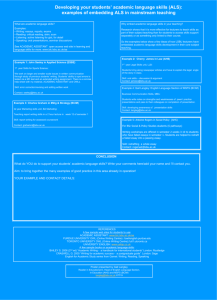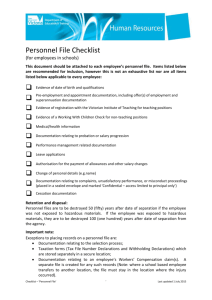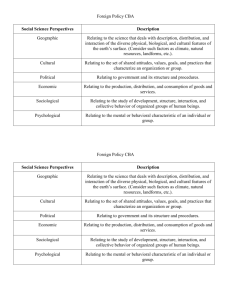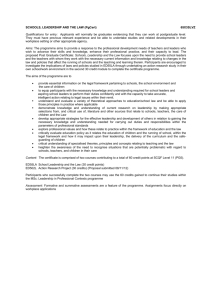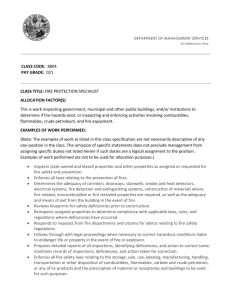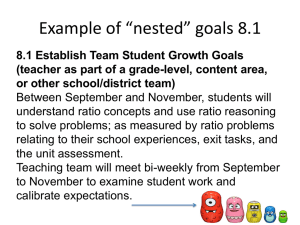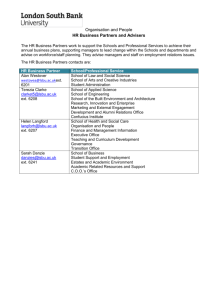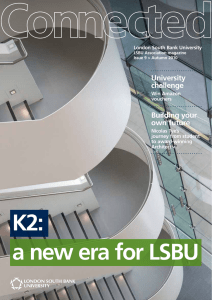human resources data protection procedure
advertisement
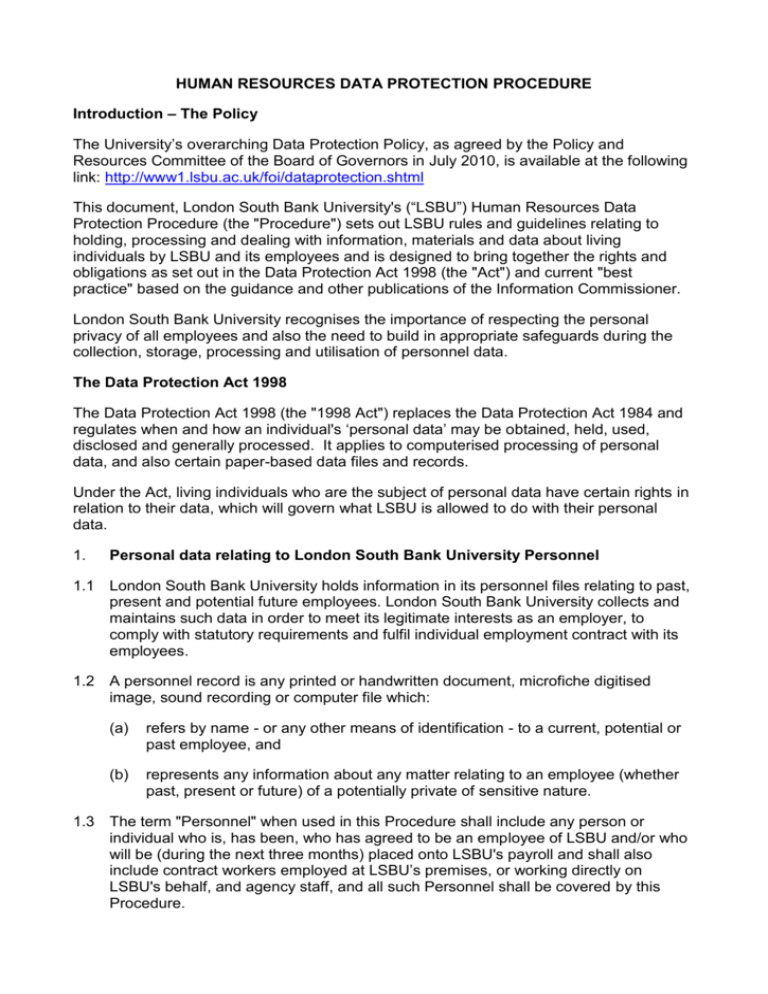
HUMAN RESOURCES DATA PROTECTION PROCEDURE Introduction – The Policy The University’s overarching Data Protection Policy, as agreed by the Policy and Resources Committee of the Board of Governors in July 2010, is available at the following link: http://www1.lsbu.ac.uk/foi/dataprotection.shtml This document, London South Bank University's (“LSBU”) Human Resources Data Protection Procedure (the "Procedure") sets out LSBU rules and guidelines relating to holding, processing and dealing with information, materials and data about living individuals by LSBU and its employees and is designed to bring together the rights and obligations as set out in the Data Protection Act 1998 (the "Act") and current "best practice" based on the guidance and other publications of the Information Commissioner. London South Bank University recognises the importance of respecting the personal privacy of all employees and also the need to build in appropriate safeguards during the collection, storage, processing and utilisation of personnel data. The Data Protection Act 1998 The Data Protection Act 1998 (the "1998 Act") replaces the Data Protection Act 1984 and regulates when and how an individual's ‘personal data’ may be obtained, held, used, disclosed and generally processed. It applies to computerised processing of personal data, and also certain paper-based data files and records. Under the Act, living individuals who are the subject of personal data have certain rights in relation to their data, which will govern what LSBU is allowed to do with their personal data. 1. Personal data relating to London South Bank University Personnel 1.1 London South Bank University holds information in its personnel files relating to past, present and potential future employees. London South Bank University collects and maintains such data in order to meet its legitimate interests as an employer, to comply with statutory requirements and fulfil individual employment contract with its employees. 1.2 A personnel record is any printed or handwritten document, microfiche digitised image, sound recording or computer file which: (a) refers by name - or any other means of identification - to a current, potential or past employee, and (b) represents any information about any matter relating to an employee (whether past, present or future) of a potentially private of sensitive nature. 1.3 The term "Personnel" when used in this Procedure shall include any person or individual who is, has been, who has agreed to be an employee of LSBU and/or who will be (during the next three months) placed onto LSBU's payroll and shall also include contract workers employed at LSBU’s premises, or working directly on LSBU's behalf, and agency staff, and all such Personnel shall be covered by this Procedure. 1.4 London South Bank University is the registered Data Controller. However, members of staff may also act as Data Controllers, either alone or jointly in common with other members of staff where personal data is to be used, and they are responsible for determining the purposes and the manner in which any personal data are to be processed. 1.5 The University's Director of Archives, Records and Information Access is Kate Kwafo-Akoto. She may be contacted in the Vice Chancellor's Department, or by telephone on 020 7815 6027. The University’s Director of Archives, Records and Information Access is responsible for specialist Data Protection advice and enquiries. For such enquiries kindly email dpa@lsbu.ac.uk. Katie Boyce, Director of Human Resources, has overall responsibility for and will deal with the administration of the Human Resources Data Protection Procedure, and she may be contacted by telephone on 020 7815 6201 or email boycek@lsbu.ac.uk. 2. Procedure All personal data relating to LSBU Personnel data shall be: 3. (a) obtained by lawful and fair means and, where appropriate, with the knowledge or consent of the employee concerned; (b) processed within the strict terms of the law, including but not limited to the Act, and any associated rules, regulations, statutory provisions, extensions or reenactments thereof and where possible, in line with any current guidance and other publications of the Information Commissioner; (c) relevant for the purposes for which it is to be used; (d) accurate, complete and up to date; (e) kept for no longer that is necessary for its declared purpose; (f) held in the full knowledge of the individual employee (except in cases specifically excluded under the 1998 Act); (g) protected by reasonable security safeguards against such risks as loss or unauthorised access, destruction, use, modification or disclosure of data; (h) protected from unauthorised cross border transmission to any other state which does not meet those standards laid down by the Council of Europe Convention (1981), the EC Data Protection Directive (95/46/EC) and the 1998 Act; Principal Purposes of Holding Data on Personnel Files 3.1 The principal purposes for holding data relating to Personnel on personnel files held by the Data Controller include but are not limited to: (a) recruitment, promotion, training, redeployment and/or career development; (b) the calculation of payroll data and the transfer of such data for use by Finance staff and independent auditors (including but not limited to details of bank/building society wage transfers and the payment of authorised expenses); (c) the determination and calculation of certain benefits, including superannuation; (d) for contacting next of kin and arranging medical attention in connection with death, illness or injury of an employee whilst at work; (e) compliance with statutory requests from the Inland Revenue, the Department of Social Security, the Benefits Agency and other relevant public authorities/ agencies; (f) disciplinary purposes arising from an employee's conduct or capability to perform their job requirements; (g) for occupational health and sickness monitoring purposes; (h) the provision of references/reports to financial institutions, qualified legal representatives, appropriate bodies in connection with the holding of public office, facilitate entry onto educational courses, permit participation on reserve military/civil protection services, assist qualified medical practitioners and potential future employers. 3.2 In all those cases cited in 3.1(h) above, the relevant information will only be disclosed following a written request from the employee/former employee concerned instructing the Data Controller, and giving consent to the Data Controller to make such disclosure. 4. Sensitive Information 4.1 The following categories of information are subject to statutory restriction and will only be held on file for specific, legitimate purposes. (a) Racial or ethnic origin This will only be recorded on personnel files, with the express permission of each employee concerned, strictly for statistical purposes in connection with "ethnic monitoring'. – i.e. to identify and keep under review the existence or absence of equality of opportunity or treatment between persons of different racial or ethnic origins, with a view to enabling such equality to be promoted or maintained. (b) Political Opinions This will not be recorded on any personnel file. (c) Religious or philosophical beliefs This will not be recorded on any personnel file. (d) Trade Union Membership This will only be held on file, with the express permission of each employee concerned, for the purposes of collecting union subscriptions by University payroll staff. (e) The processing of data concerning health or sex life Only data relating to: (i) occupational health; (ii) sickness absence records; (iii) the chronic illness of a specific employee in circumstances which may affect their ability to perform all aspects of the normal work; and (iv) data to comply with the Disability Discrimination Act (1995) will he held on file. Data relating to iii) and iv) above will be collected and retained only with the express permission of the individual employees concerned. All Human Resources Staff who have access to health records shall be instructed that such information must be treated as confidential. 4.2 The University also recognises the rights of employees under the Rehabilitation of Offenders Act 1974 and any associated Orders of the Secretary of State, other rules, regulations, or statutory provisions and will maintain any conviction records on file for only those periods which are permissible under the Act. This will be in line with our entitlement under Schedule 3(2)(1) of the 1998 Data Protection Act. 4.3 Under Section 8 of the Asylum and Immigration Act of 1996 LSBU is entitled to request, and hold copies of, documents specified within the Act for all new, and prospective, employees entering (or applying for) employment after 31 January 1997. This will be carried out without prejudice to employees' (and prospective employees') rights under the Race Relations Act 1976. 4.4 The University reserves the right to 'back up' data files and hold secure multiple copies of personal data relating to specific employees in order to protect its interests in the event of data loss. 5. Restriction of Access to Personnel Data 5.1 London South Bank University may place all or part of its files onto a secure computer network and with restricted access to personnel data. When implemented access to individual employee data will only be granted to the following data users within London South Bank University for specific and legitimate purposes: (a) Staff employed in the Human Resources Department; (b) A member of staff’s Head of Department/Executive Dean/line manager; (c) Staff employed in the payroll section of the Finance Department; (d) Corporate medical staff; (e) Staff Development staff; (f) 6. Any specified and contracted computer bureau (acting under the direction of the Data Controller, or his/her representative) used to process internal corporate data - providing secure processing facilities and data access in line with statutory provisions and the requirements of LSBU. Evaluation based on Automated Processing of Data No data shall be held on London South Bank University's personnel files which is based solely on automated processing of data intended to evaluate certain personal aspects relating to an individual employee, such as his performance at work, creditworthiness, reliability or conduct. 7. Further Information All employees have the right to know whether or not any personal data relating to them is being processed and to receive information relating to the description of the data, the purposes for which their personal data is or is to be processed, from whom it is received, to whom it is disclosed. All employees have the right to receive a copy of such personal data and have the right to correct any errors which exist on record about them. When further data is requested from them, they may know if replies to the questions are obligatory or voluntary and the possible consequences of failure to reply. 8. Access to Personnel Files by Employees 8.1 All employees shall have reasonable access to their own personnel files together with any medical reports and health records held by London South Bank University, where they have requested this, and under the terms of the Access to Medical Records Act (1988) and Access to Medical Records Act (1990) and Data Protection Act 1998. No charge shall be made to the employee for the provision of this information. Employees who wish to gain access to these reports/records should write to the Head of Human Resources requesting this. The provision of personnel data relating to an individual employee shall be satisfied within forty days from receipt of a written request from that employee. 8.2 London South Bank University reserves the right to withhold: (a) information in the case of repeat requests from individual employees made unreasonably frequently; (b) specific information if the University cannot comply with an employee's request without disclosing information relating to another individual who can be identified from that information (including its source). This will be waived where the University is: (i) satisfied that the other individual has consented to the disclosure of the information to the employee making the request, or (ii) It is reasonable in all the circumstances to comply without the consent of the other individual; (c) any data which is excluded through legislation on the grounds of national security, breaches of ethics for regulated professions, or is relevant to any current investigation concerning any possible criminal/civil legal action. Personal data are also exempt if they consist of a reference given or to be given in confidence by the Data Controller for the purposes of: (i) the education, training or employment or prospective education, training or employment, of the data subject; (ii) the appointment, or prospective appointment, of the data subject to any office, or (iii) the provision, or prospective provision, by the data subject of any service. It is important to note that these exemptions only apply to confidential references given to any third party. A Data Subject has the right to request a copy of such a reference from the person to whom it was sent, however they do not have the right to ask the originator for a copy. 8.3 All manual files must be examined under supervision within the Human Resources Department and this will be arranged by the Head of Human Resources or a senior member of Human Resources staff. Appropriate clarification/guidance concerning the computerised or manual files will be given, on request, by specialist personnel staff. No record may be altered or removed without the express permission of the Head of Human Resources, acting as the Data Controller's representative. 8.4 The data supplied will, whenever practicable, relate to the date when the request was first received. 8.5 Employees have the right to make any reasonable request for the amendment of their own personnel records provided that: 9. (a) they can readily demonstrate the existence of an identifiable error, necessary update, relevant omission, superfluous fact, or (b) it is unlawful to maintain such a record. Retention 9.1 Application forms, interview records and references for unsuccessful internal and external candidates should be kept for a period of twelve months following the interview. Retention beyond this period would require demonstration of a clear business need by the University and consent obtained from the individual. This applies to all manual files including any notes taken by anyone at interviews as well as computerised files. Care should be taken by anyone at an interview panel as all their notes/scribbles become part of the file and must be produced within forty days of a written request being received by the Head of Human Resources. 9.2 All employee data other than the name, job title, department and period of employment at the University should be deleted six years after employment has ended. Data relating to disciplinary and grievance records of current employees are removed from personal files once they become spent in accordance with the University’s disciplinary procedure and deleted three years from the date issued. Where disciplinary or grievance cases have involved concerns of sufficient severity or gravity data will be deleted five years from the date issued. 9.3 Once an employee has left the University any data relating to them within their department or Faculty should be sent to Human Resources. 10. The Right to Object 10.1 An employee is entitled at any time, by notice in writing, to require London South Bank University to cease within a reasonable time from processing any personal data because it is causing or likely to cause, substantial damage or distress to themselves or another individual. The reasons for this request must be clearly stated and specified at the time. The Data Controller must respond within twenty one days stating whether it intends or has complied as the reasons why the notice is unjustified and the extent to which it intends to comply (if at all.) 10.2 London South Bank University reserves the right to collate, process and disseminate statistics based on an aggregation or data held on its personnel files, provided the data relating any individual employee may not he identified from the resulting analysis. 10.3 All employees have a general duty to respect the rights of London South Bank University to protect any information relating to its products, services, methods, organisation and/or plans. The right will extend to patents, patent applications, copyrighted material, registered designs and design applications, 'insider' financial details and all information of a commercially sensitive nature which is clearly understood by the employee to be confidential and where no authorised use has been granted. 10.4 In the case of a dispute concerning any specific application of this Procedure, the matter should be brought to the attention of the Data Protection Officer. Human Resources Department 2004 Updated June 2009 Updated July 2010 (Webloaded/02AUG10/TP)
